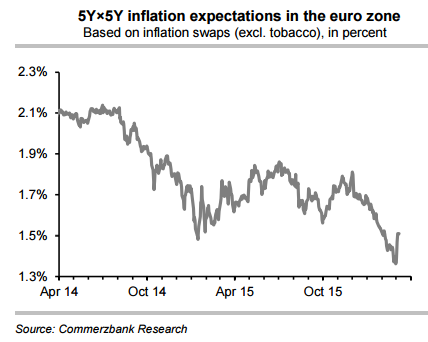Euroarea headline inflation in February slipped back into negative territory, came in at -0.2% from +0.5% in January. Core inflation unexpectedly plunged 0.3pp to +0.7%, just above the all-time low (+0.6%) reached in January 2015. Since the December meeting, eurozone economic outlook and inflation have weakened, leading indicators have fallen short of expectations. More easing from the ECB on 10 March looks virtually certain. Draghi may not want to repeat the disappointment that took place after the December meeting.
At the March 10th meeting, ECB is expected to lower projections for growth and inflation slightly for the coming years. President Draghi is expected to stress that the ECB's revised inflation profile is surrounded by downside risks since the recent drops in headline and core inflation will likely not be incorporated in the updated projected outlook due to cut-off date reasons.
"The ECB to revise down its 2016 and 2017 inflation forecasts from +1.0% and +1.6% projected in December to +0.4% and +1.4%, respectively. This compares with our revised forecast that inflation is likely to average +0.1% this year and +1.0% next", says Barclays in a research report.
The likelihood of a two-tier system has recently increased from the comments by ECB speakers and the recent increase in lending rates in some countries. The ECB may loosen or remove the deposit rate floor constraint on the purchases in the public sector purchase programme (PSPP) and further broaden the universe of eligible assets than to remove the capital key or bond specific limits.
"News about ECB deliberations ahead of the policy meeting next week indicate growing concern about pushing rates further into negative territory. The focus might be shifting to asset purchases and implementing a tiered deposit rate on excess reserves. This could just be trying to rearrange the deck chairs, as the impact of unconventional policies fade." notes Societe Generale in a report.
Recent indicators suggest that the current modest economic recovery remains driven by domestic demand. February passenger car registrations recorded double-digit annual growth in Germany (+12.1%), France (+13.0%), Italy (+27.3%) and Spain (+12.6%). Euro area retail sales also came in on the strong side in January, beating expectations and advancing for the third consecutive month. Moreover, the latest labour market data for January were reassuring about the euro area private consumption outlook.
"While the outlook for private consumption appears solid, the long-awaited investment rebound may continue to lag, implying downside risks to our expectation that growth will improve +1.6% this year and 1.8% next", adds Barclays.
EUR/USD was trading weaker on the day at around 1.0952 at 1000 GMT, while EUR/GBP was at 0.7740.
ECB to lower projections for growth and inflation at March 10th meet and take further action

Monday, March 7, 2016 10:18 AM UTC
Editor's Picks
- Market Data
Most Popular



 BOJ Holds Interest Rates Steady, Upgrades Growth and Inflation Outlook for Japan
BOJ Holds Interest Rates Steady, Upgrades Growth and Inflation Outlook for Japan  ECB’s Cipollone Backs Digital Euro as Europe Pushes for Payment System Independence
ECB’s Cipollone Backs Digital Euro as Europe Pushes for Payment System Independence  RBA Raises Interest Rates by 25 Basis Points as Inflation Pressures Persist
RBA Raises Interest Rates by 25 Basis Points as Inflation Pressures Persist  BOJ Rate Decision in Focus as Yen Weakness and Inflation Shape Market Outlook
BOJ Rate Decision in Focus as Yen Weakness and Inflation Shape Market Outlook 






























